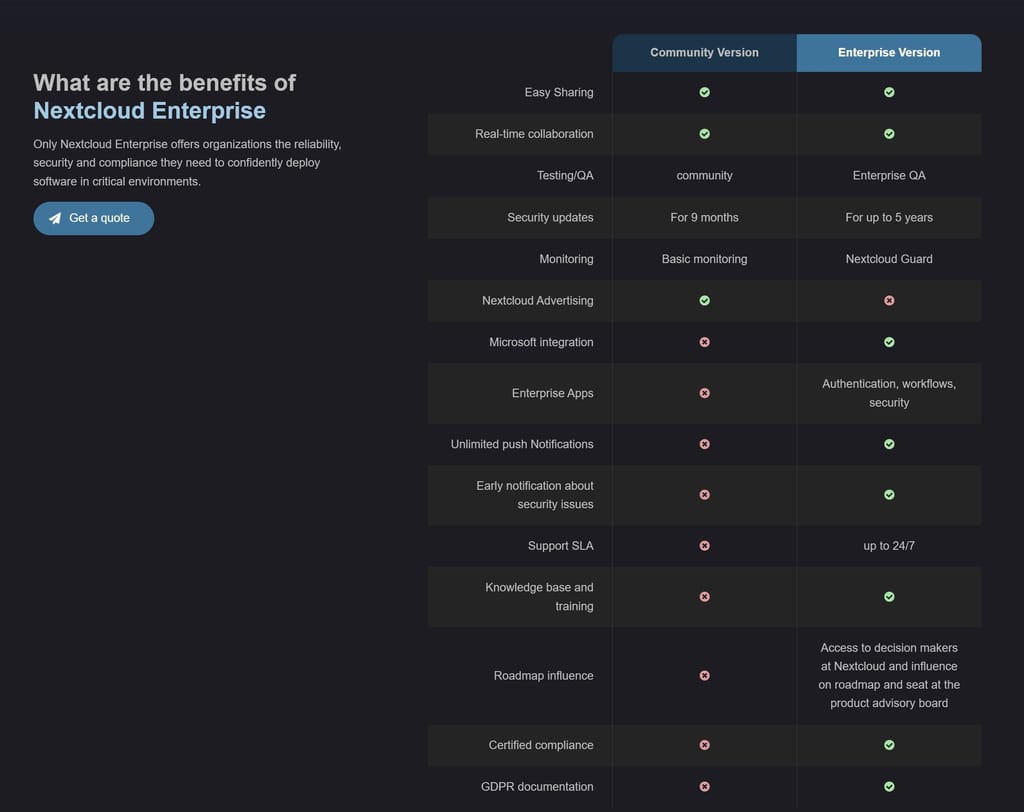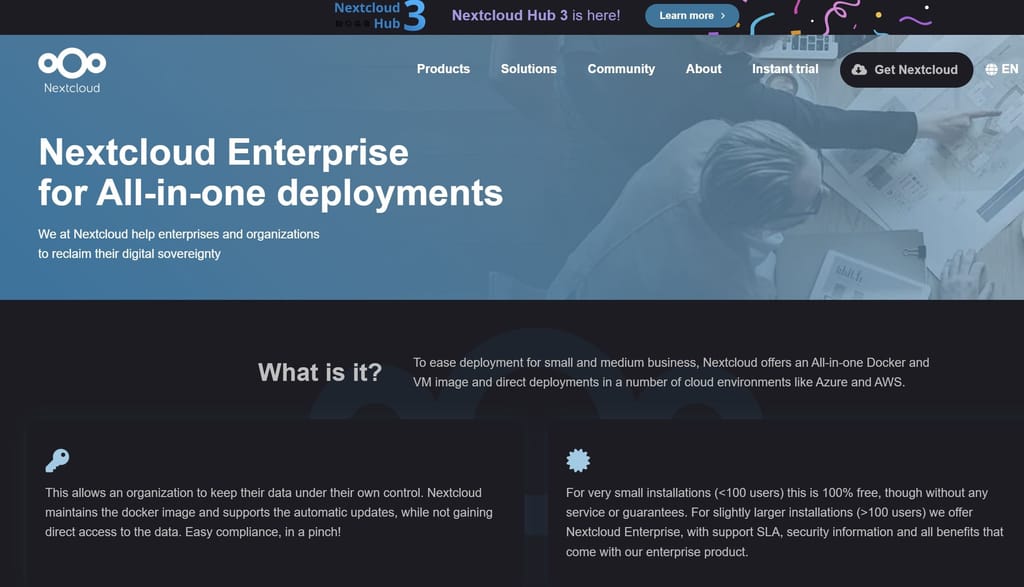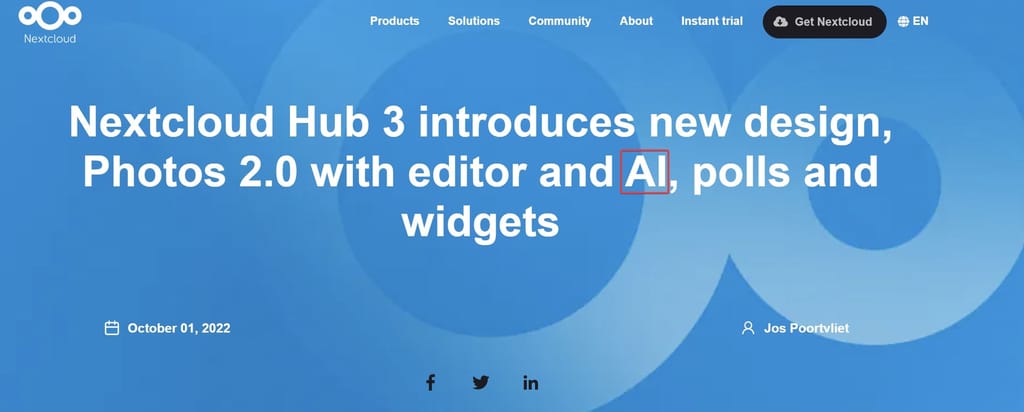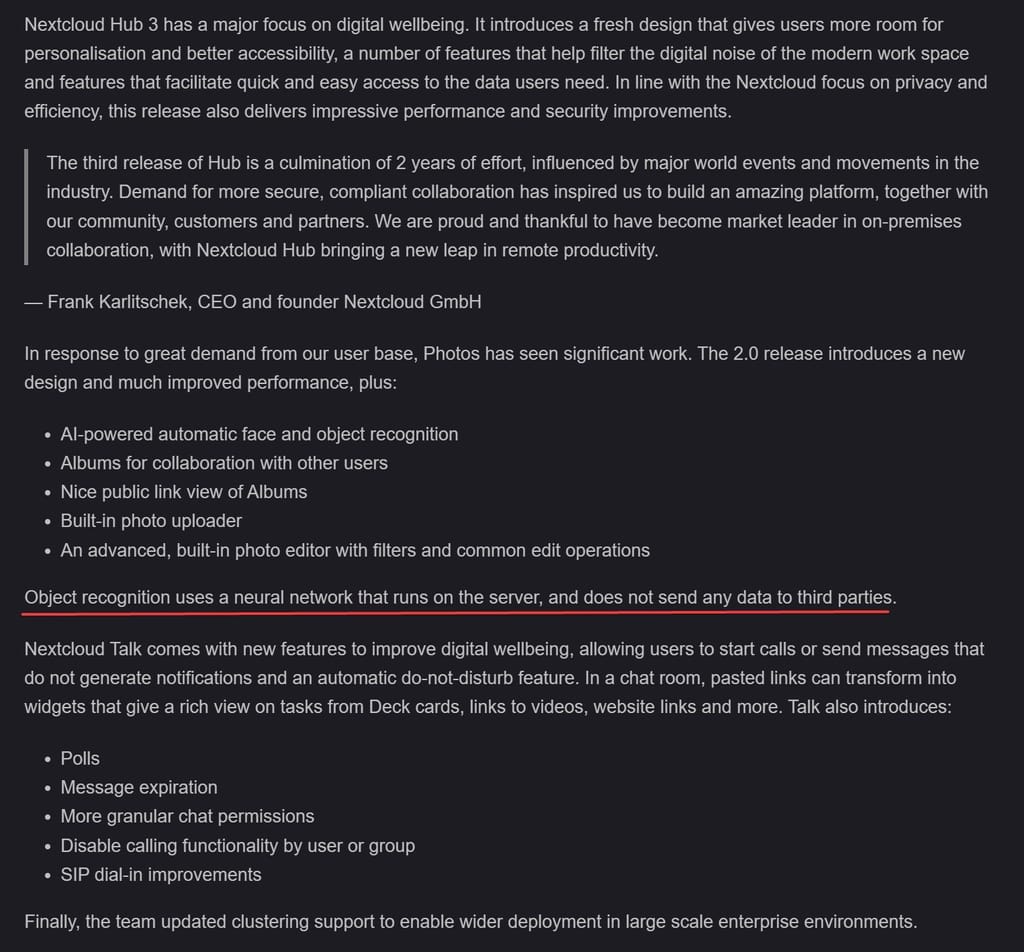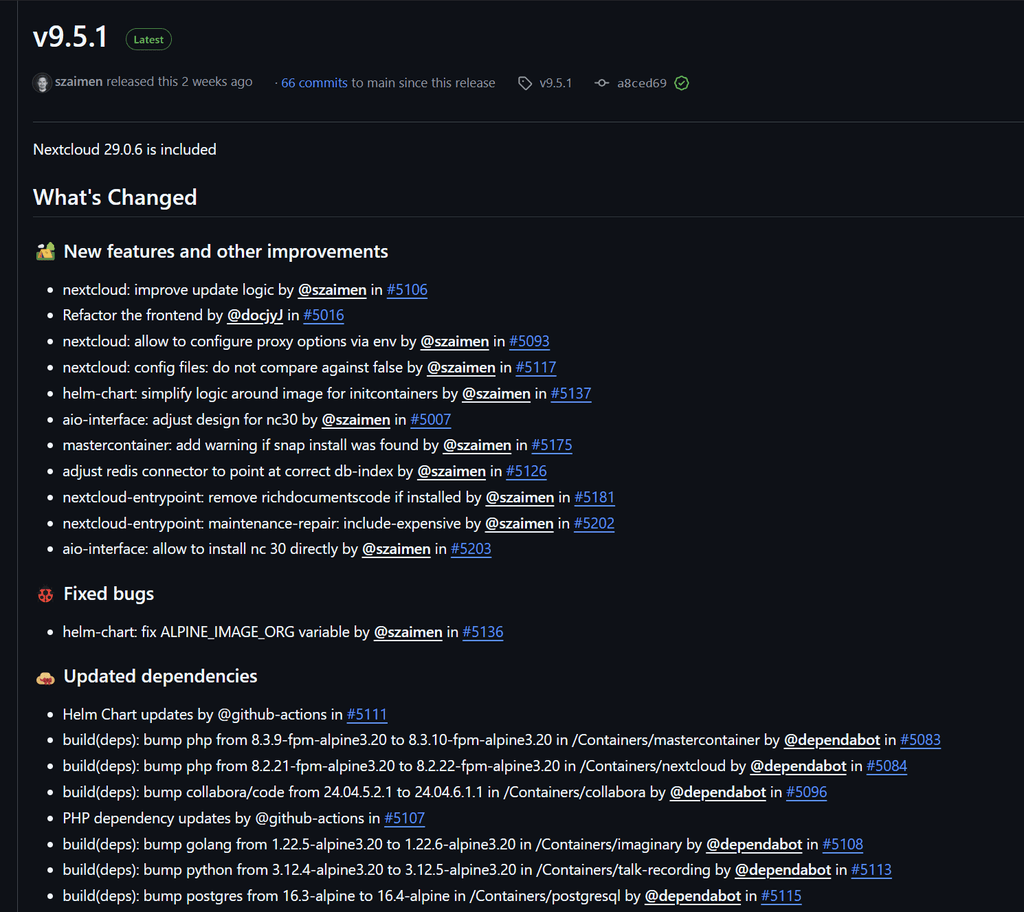Nextcloud All-In-One (AIO)
-
We've already done some of this ourselves, but I wonder if it might be more feature-complete, and now Nextcloud supported, to move towards Cloudron's Nextcloud App following the Nextcloud AIO package?
It also seems to follow a similar philosophy:
This project values stability over new features. That means that when a new major Nextcloud update gets introduced, we will wait at least until the first patch release, e.g. 24.0.1 is out before upgrading to it. Also we will wait with the upgrade until all important apps are compatible with the new major version.
-
We've already done some of this ourselves, but I wonder if it might be more feature-complete, and now Nextcloud supported, to move towards Cloudron's Nextcloud App following the Nextcloud AIO package?
It also seems to follow a similar philosophy:
This project values stability over new features. That means that when a new major Nextcloud update gets introduced, we will wait at least until the first patch release, e.g. 24.0.1 is out before upgrading to it. Also we will wait with the upgrade until all important apps are compatible with the new major version.
@marcusquinn Looks very nice!
-
We've already done some of this ourselves, but I wonder if it might be more feature-complete, and now Nextcloud supported, to move towards Cloudron's Nextcloud App following the Nextcloud AIO package?
It also seems to follow a similar philosophy:
This project values stability over new features. That means that when a new major Nextcloud update gets introduced, we will wait at least until the first patch release, e.g. 24.0.1 is out before upgrading to it. Also we will wait with the upgrade until all important apps are compatible with the new major version.
@marcusquinn said in Nextcloud All-In-One (AIO):
when a new major Nextcloud update gets introduced, we will wait at least until the first patch release, e.g. 24.0.1 is out before upgrading
This bit is also already Cloudron policy.
BUT but these bits:
High performance backend for Nextcloud Files
High performance backend for Nextcloud Talk
...
FulltextsearchYes please!

-
@marcusquinn said in Nextcloud All-In-One (AIO):
when a new major Nextcloud update gets introduced, we will wait at least until the first patch release, e.g. 24.0.1 is out before upgrading
This bit is also already Cloudron policy.
BUT but these bits:
High performance backend for Nextcloud Files
High performance backend for Nextcloud Talk
...
FulltextsearchYes please!

-
We've already done some of this ourselves, but I wonder if it might be more feature-complete, and now Nextcloud supported, to move towards Cloudron's Nextcloud App following the Nextcloud AIO package?
It also seems to follow a similar philosophy:
This project values stability over new features. That means that when a new major Nextcloud update gets introduced, we will wait at least until the first patch release, e.g. 24.0.1 is out before upgrading to it. Also we will wait with the upgrade until all important apps are compatible with the new major version.
@marcusquinn Blog entry with setup instructions: https://nextcloud.com/blog/your-guide-to-the-nextcloud-all-in-one-on-windows-10-11/
-
We've already done some of this ourselves, but I wonder if it might be more feature-complete, and now Nextcloud supported, to move towards Cloudron's Nextcloud App following the Nextcloud AIO package?
It also seems to follow a similar philosophy:
This project values stability over new features. That means that when a new major Nextcloud update gets introduced, we will wait at least until the first patch release, e.g. 24.0.1 is out before upgrading to it. Also we will wait with the upgrade until all important apps are compatible with the new major version.
-
@marcusquinn Blog entry with setup instructions: https://nextcloud.com/blog/your-guide-to-the-nextcloud-all-in-one-on-windows-10-11/
There is now also a guide for Linux: https://nextcloud.com/blog/how-to-install-the-nextcloud-all-in-one-on-linux/
-
@LoudLemur Thanks, although not the subject of this thread, which is specific to the AIO repo on GitHub.
This thread is more on what you're noticing with v25 (Hub 3.0):
-
N necrevistonnezr referenced this topic on
-
 M marcusquinn referenced this topic on
M marcusquinn referenced this topic on
-
N necrevistonnezr referenced this topic on
-
I had some down time today and played a bit with the with the aio project. It makes a few strange design decisions ihmo. Like the container providing the Nextcloud installation itself runs both Apache for the actual files and then has Caddy in the same container as a reverse proxy and for automatic ssl. This same container also has the Docker socket mounted, which I would not really recommend for an external facing service.
In the end I had to pause my experiments since the container always wants to retrieve a ssl certificate for the given hostname, but I did not want to make a public dns record for my tests.
-
I had some down time today and played a bit with the with the aio project. It makes a few strange design decisions ihmo. Like the container providing the Nextcloud installation itself runs both Apache for the actual files and then has Caddy in the same container as a reverse proxy and for automatic ssl. This same container also has the Docker socket mounted, which I would not really recommend for an external facing service.
In the end I had to pause my experiments since the container always wants to retrieve a ssl certificate for the given hostname, but I did not want to make a public dns record for my tests.
@fbartels Actually it works a bit like Cloudron. It also uses the docker socket to create additional containers:
https://github.com/nextcloud/all-in-one#how-does-it-workHere you can see which containers get started and in which way they are interconnected: https://github.com/nextcloud/all-in-one/blob/main/manual-install/latest.yml
-
Just as a heads-up to this: it will soon be possible for the community to add further containers to AIO. See https://github.com/nextcloud/all-in-one/tree/main/community-containers
-
Can we move this topic to the App Wishlist?
-
 G girish moved this topic from Nextcloud on
G girish moved this topic from Nextcloud on
-
N necrevistonnezr referenced this topic on
-
Has anyone looked at this further? because nextcloud in cloudron is still missing a lot of things that come 'preinstalled' with AIO. Honestly the main reason why I'm not using nextcloud via Cloudron
-
-
@LoudLemur may I ask why you posted the release link to v9.5.1 of AIO here?
-
@LoudLemur may I ask why you posted the release link to v9.5.1 of AIO here?
@szaimen said in Nextcloud All-In-One (AIO):
@LoudLemur may I ask why you posted the release link to v9.5.1 of AIO here?
Sure, Nextcloud Hub9 was just released a few days ago. Nextcloud's latest AIO is version 9.6.0.
This thread began in January 2023, when Nextcloud AIO was version 7.9.1
https://github.com/nextcloud/all-in-one/releases?page=5
There has been a lot of progress.
-
Has anyone looked at this further? because nextcloud in cloudron is still missing a lot of things that come 'preinstalled' with AIO. Honestly the main reason why I'm not using nextcloud via Cloudron
@Thibaultmol said in Nextcloud All-In-One (AIO):
Has anyone looked at this further? because nextcloud in cloudron is still missing a lot of things that come 'preinstalled' with AIO. Honestly the main reason why I'm not using nextcloud via Cloudron
Yeah, I do host my Nextcloud on Cloudron but I'd really love to have all the features of this AIO package added to the Cloudron package too

-
 A andreasdueren referenced this topic on
A andreasdueren referenced this topic on
-
Another upvote for Nextcloud AIO. OP created this topic almost 2 years ago and since then, Nextcloud AIO has not only become very stable but also has a mature feature set.
-
Another upvote for Nextcloud AIO. OP created this topic almost 2 years ago and since then, Nextcloud AIO has not only become very stable but also has a mature feature set.
@hakunamatata tbh I don't think we'll ever have AIO on Cloudron
-
I would love to have AIO as an option on Cloudron

